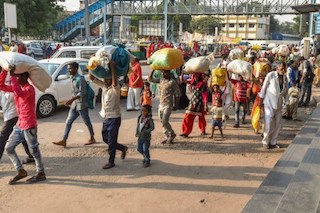During these times of high unemployment and a weak economy, NREGA is critical for two reasons: as the sole income source for many vulnerable rural households, and if improved and made more efficient then as a way to move labour markets in favour of migrant workers. We provide a ground-up view of the challenges in NREGA operations based on our recent experiences and describe how the tumultuous lives of migrant workers can be made less precarious through well-functioning and better-funded social protection mechanisms.
The detailed results from our work in NREGA are here. Some top-level highlights below. An article based on this research, NREGA as social protection and beyond: A shot at dignity for workers, can be read here.
- Not everybody who applies for a job-card is able to get one. Only about 60-65% of job-card applicants we worked with, received their job-cards.
- About 90% of them received their job-cards within 3 weeks.
- However, only 50% of those who applied for work were able to get it. Another 30% got work but only for 10 days.
- Those who did work, 56% received their payments within 10 days, and another 22% within 3 weeks. The remaining 22% had not received their wages even after a month.
- There is in general a lack of awareness among workers on the formal means to demand work. The government has established positions of Rozgar Sewaks for this purpose, to hand-hold people to get job-cards and register for work, but many Sewaks remain absent. A fortnightly organization of the Rozgar Diwas is also not done regularly.
- Group based registration, work demand, and grievance redressal drives, like through the Rozgar Diwas and assisted by Rozgar Sewaks, can be instrumental in helping more people access MGNREGA. Such initiatives should be rigorously imposed, and extended to other welfare schemes as well.
- Several other issues hamper MGNREGA as well. The availability of funds at the local funds, corruption through the use of machines and ghost-workers concealed by middlemen, and DBT issues with Aadhaar linkage, dampen the impact that MGNREGA can have, especially during current times when unemployment is high and migrant workers need to find work closer to home.



